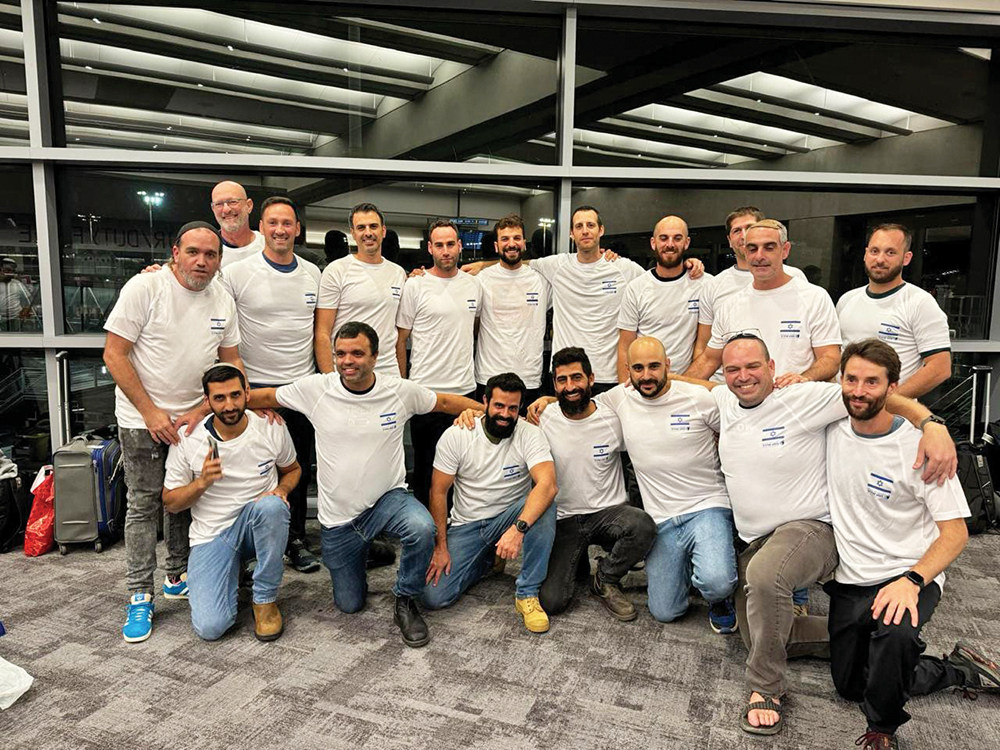Last year during Chol Hamoed Pesach, my recently married daughter and son-in-law were flying to Florida to join his family for the last days of Pesach. My daughter called us at 10:30 p.m. when they landed. “Help! I forgot my sheitel box with my Shabbos sheitel at the gate in Newark airport!” We called Newark airport—no answer. We called the airline—no answer. Everything was closed for the night. I posted in my WhatsApp online to ask if anyone was flying out of Newark that night, but there were no more flights. Someone suggested the Chaverim group in nearby Union County. Bingo! They took all the info—name, airline, flight number, gate number and lost and found claim number—and drove off. They also asked for a picture of the sheitel box, so they could look for it in the lost and found area.
Several minutes later, my phone rang again. “Great news! We located the sheitel.” The Chaverim volunteer said they found the missing box in the lost and found! Meanwhile, another Chaverim member, Yossi Pinter from Passaic, called in saying, “I’m coming back to Passaic. Do you want me to bring it to your house?” At 1:00 a.m., Yossi pulled up to my house with the sheitel box in hand. What incredible hashgacha pratis (divine providence)! My daughter’s lost new sheitel was found and even delivered to my door in a matter of hours! We even found someone flying to Florida the next day, so we were able to send it to my daughter in time for Yom Tov. This is an example of what fellow Jews will do for you.
The Gemara notes that the Torah mentions Yetzias Mitzrayim (the Exodus from Egypt) when teaching about three particular mitzvos: wearing tzitzis, having honest weights and scales and the prohibition of charging interest. The Torah mentions Yetzias Mitzrayim by these mitzvos to warn a person who might be tempted to be dishonest, while at the same time appearing on the surface to be honest. Hashem is saying that just as in the plague of the firstborn, I differentiated between the firstborn of the Egyptians and those of Bnei Yisrael, I will discern and punish anyone who attempts to camouflage their lack of compliance regarding these three mitzvos.
Why are these three mitzvos singled out for attempted deceit? The Maharal explains that these mitzvos depict some basic distinctions between Jews and non-Jews. Tzitzis transform a physical garment into a mitzvah. Indeed, mitzvos are given to the Jewish nation to elevate even mundane physical actions and activities. With regard to charging interest, the Torah specifically prohibits usury in the case of another Jew, as he is considered a family member and one does not charge interest when lending money to family members in need. However, charging interest to a non-Jew is permitted, as it is a normal business practice. Honest weights also symbolize a moral distinction between Jews and the other nations.
We are distinct from other nations, with our Jewish values and identity derived from the Torah. To preserve those values and identity, the Torah warns Bnei Yisrael in parshas Acharei Mos, “Don’t perform the actions of the Egyptians where you lived, and don’t perform the actions of the inhabitants of the land of Canaan to which I will bring you, and don’t follow their traditions.” Rashi explains that the Torah singles out these two nations because they had the most decadent behavior.
This begs a question: If Hashem didn’t want the Jewish people to act like these two specific civilizations, then why, out of all places, did Hashem place the Jewish nation in these locations?
Rav Chaim Freidlander quotes the Maharal, who explains that if the Jewish nation were placed among a nation similar to themselves, the differences between them would be blurred—possibly leading to assimilation. Therefore, Hashem specifically placed the Jews among nations whose behaviors and values were radically different from theirs. Seeing the abhorrence of the actions of the other nations strengthened the commitment of the Jewish people to the Torah’s values and helped prevent them from assimilating.
Nonetheless, Jews today should not intentionally place themselves in this type of extreme scenario, since they would need special siyata dishmaya (with God’s help) not to be adversely influenced. Only if Hashem places us in that situation, does He grant us the siyata dishmaya not to be influenced.
In the lost sheitel incident above, our family got to witness personally how Jewish people jumped at the opportunity to help another Jew—even though they did not know us. That’s what being “family” is all about.
Yidden are one large family blessed by Hashem. It behooves us to always stick together and treat each other with kindness and respect.
Rabbi Baruch Bodenheim is the associate rosh yeshiva of Passaic Torah Institute (PTI)/Yeshiva Ner Boruch, where he leads a multi-level Gemara learning program. PTI has attracted adult Jews of all ages from all over northern New Jersey for its learning programs. Fees are not charged, but contributions are always welcome. Rabbi Bodenheim can be reached at [email protected]. For more info about PTI and its Torah classes, visit www.pti.shulcloud.com.












